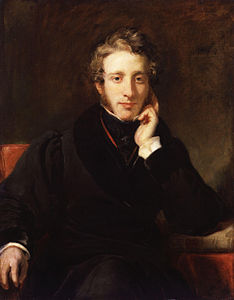Edward Bulwer-Lytton
Edward George Earle Lytton Bulwer-Lytton, nado en Londres o 25 de maio de 1803 e finado en Torquay o 18 de xaneiro de 1873, foi un escritor e político inglés. Foi extremadamente popular como orador e escribiu unha serie de obras novelísticas de gran difusión e vendas, o cal lle supuxo unha importante cantidade de diñeiro.
Obra
editarNovela
editar- Leila: or The Siege of Granada (1838)[1]
- Calderon, the Courtier (1838)
- Zicci: a Tale (1838)[2]
- The Pilgrims of the Rhine (1834)
- Falkland (1827)
- Pelham: or The Adventures of a Gentleman (1828)[3]
- The Disowned (1829)
- Devereux (1829)
- Paul Clifford (1830)[4]
- Eugene Aram (1832)[5]
- Godolphin (1833)
- Falkland (1834)
- The Last Days of Pompeii (1834)[6]
- Rienzi, the last of the Roman tribunes (1835)[7]
- The Student (1835)
- Ernest Maltravers (1837)
- Alice, or The Mysteries (1838) secuela de Ernest Maltravers[8]
- Night and Morning (1841)[9]
- Zanoni (1842)[10]
- The Last of the Barons (1843)[11]
- Lucretia (1846)[12]
- Harold, the Last of the Saxons (1848)[13]
- The Caxtons: A Family Picture (1849)[14]
- My Novel, or Varieties in English Life (1853)
- The Haunted and the Haunters or The House and the Brain (novela curta, 1859)[15]
- What Will He Do With It? (1858)
- A Strange Story (1862)[16]
- The Coming Race (1871),[17]
- Kenelm Chillingly (1873)
- The Parisiens (1873 inacabada
Poesía
editar- Ismael (1820)
- The New Timon (1846), un ataque a Alfred Tennyson publicado anonimamente
- King Arthur (1848–9)
Teatro
editar- The Duchess de la Vallière (1837)
- The Lady of Lyons (1838)[18]
- Richelieu (1839)
- Money (1840)
- Not So Bad as We Seem, or, Many Sides to a Character: A Comedy in Five Acts (1851)
- The Rightful Heir (1868), baseada en The Sea Captain, unha obra previa de Lytton
- Walpole, or Every Man Has His Price
- Darnley (inacabada)

